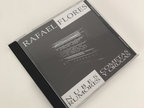El Sopor es el nombre que he venido utilizando desde mediados de los años 80, a modo de productora, para mis trabajos en video.
En 1985 se editó por el sello holandés Korm Plastics "El Sopor - Video Soundtracks" una cassette C30, con referencia KP 14, que recogía los audios utilizados en la realización de algunos de mis primerizos ensayos videográficos aún con el alías de Comando Bruno.
Estas grabaciones serían remasterizadas y reeditadas en 1999 en formato CD por el mismo sello. Igualmente existe una edición no autorizada de la cassette, con diferente portada a la original, del sello australiano Zero Cabal.
El segundo volumen, que permanecía inédito y que recupera trabajos realizados entre los años 1994 y 2005, ha sido publicado, en formato exclusivamente digital, en marzo de 2021.
El tercer volumen de la serie, publicado en abril de 2004 y por tanto con anterioridad al segundo, fue una auto edición limitada y no venal, en formato mini CDr de 145 ejemplares.
Las tres ediciones están ya disponibles para su escucha y descarga en www.rafaelflores.bandcamp.com
El Sopor (Video Soundtracks)
Remastered at "the laboratory"
Exclusive Distribution: Staalplaat Netherlands 1999
El Sopor (Cass C30) Zero Cabal Australia (Bootleg)
Distribution RRRecords USA











